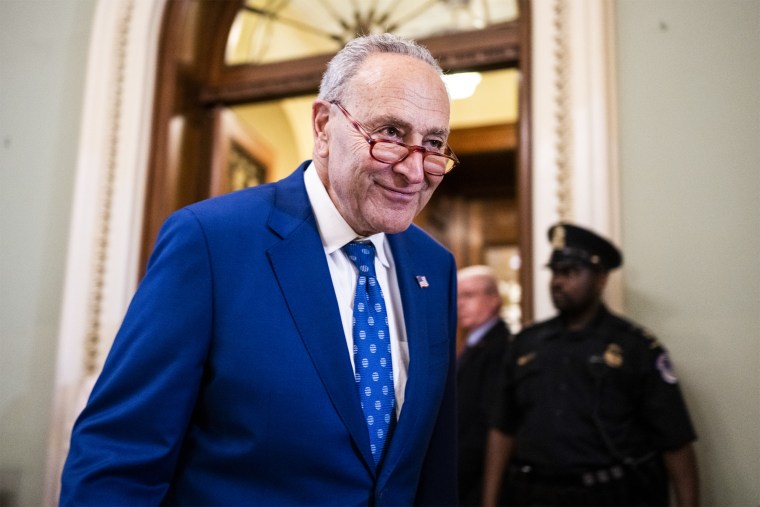WASHINGTON — Senate Democrats have reached an agreement to raise taxes on some high earners who they say are abusing a loophole to slash their tax bills, two sources familiar with the discussions said.
The lawmakers, the sources said, plan to close the tax break for those earning more than $400,000 a year, requiring them to pay 3.8% in taxes on certain income from pass-through businesses, in what is effectively a slimmed-down package after the Build Back Better Act stalled last year.
They project that closing the tax loophole would raise about $200 billion over a decade, a source said, which would be used to pay for Medicare through 2031 in an effort to keep the federal health care program from going bankrupt.
Without congressional intervention, the program’s hospital insurance trust fund is poised to begin running out of money by 2028.
Senate Majority Leader Chuck Schumer, D-N.Y., and Sen. Joe Manchin, D-W.Va., have been privately negotiating a bill that would include prescription drug savings — which they've reached an agreement on — as well as energy and climate funding and tax increases on upper earners and corporations. They haven't struck a deal on a larger package, and it's unclear whether they will.
But Manchin's office offered a vote of confidence Thursday for the tax agreement to extend the life of Medicare.
“Medicare is a lifeline for millions of American seniors and Senator Manchin has always supported pathways to ensure it remains solvent. He remains optimistic there is a path to do just that,” Sam Runyon, a spokesperson for Manchin, said in a statement.
The tax proposal will be submitted in the coming days to a Senate official to ensure it complies with the complicated rules of a special budget process, a source said, which would allow Democrats to pass it with a simple majority.
Pass-through entities can be sole proprietorships or partnerships. For example, partners in law firms can claim part of their incomes as salary and the rest as distributed profits — and pay fewer taxes as a result. The new plan seeks to curtail that.
The policy "would ensure that high-income owners of certain pass-through businesses pay the 3.8% net investment income tax [NIIT] on their income to fund health care," said a source familiar with the proposal. "Keeping with President Biden’s promise not to raise taxes on anyone earning under $400,000, the pass-through NIIT proposal applies to individuals earning more than this amount and to joint filers, trusts and estates earning more than $500,000."
Democratic leaders believe the latest proposals have the support of all 50 senators in the caucus, the source said.


